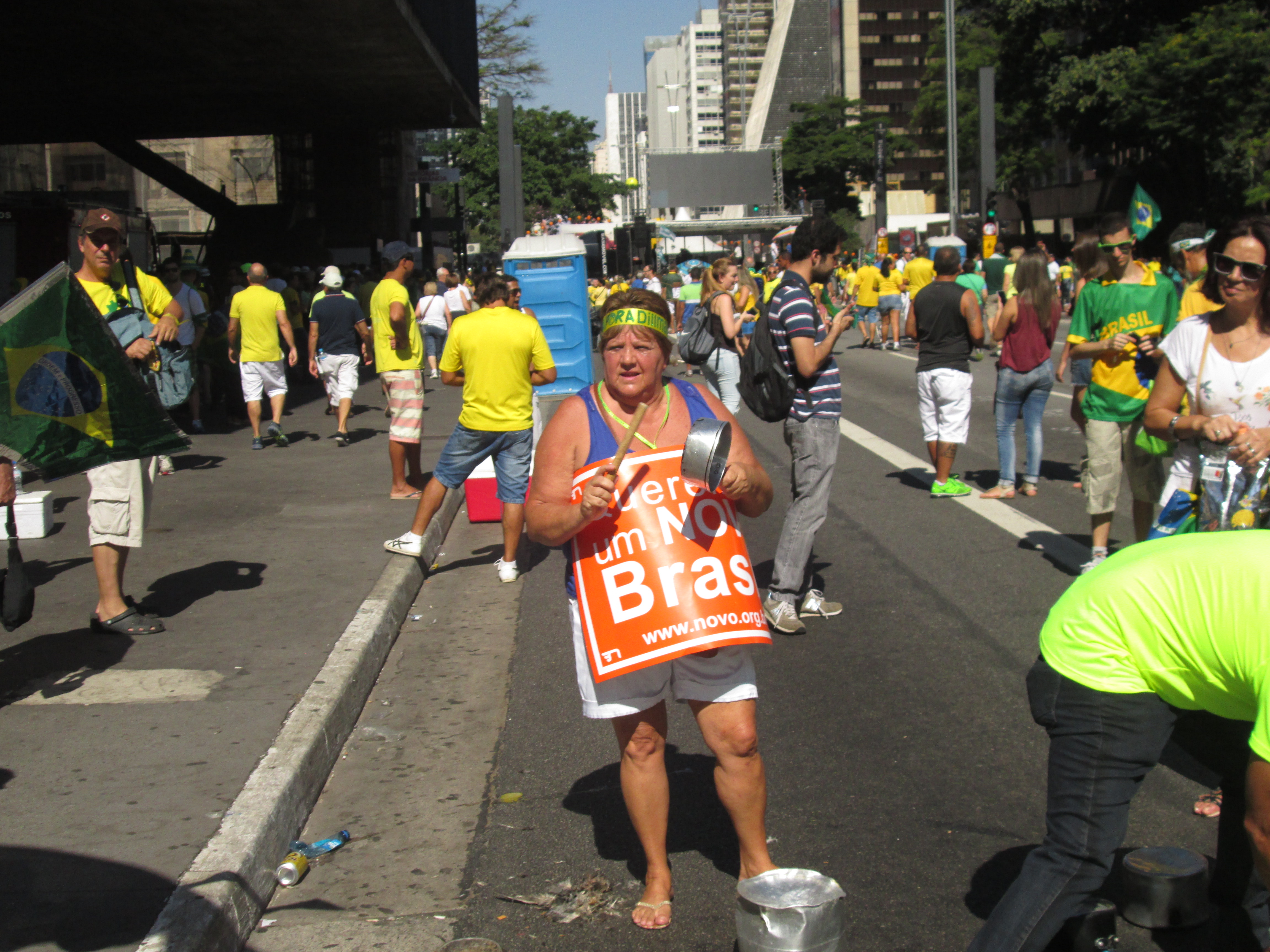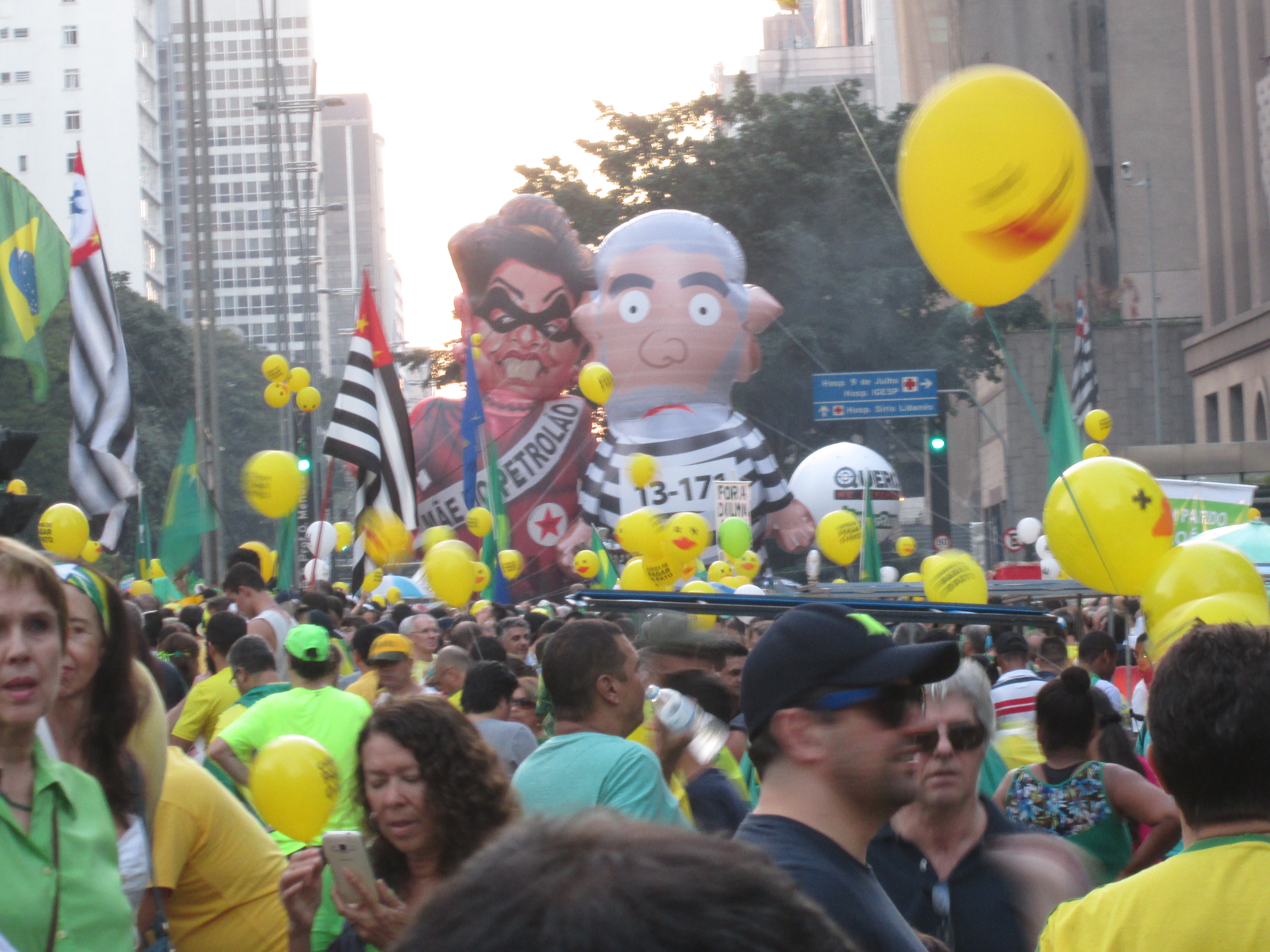As Bolsano and Lula face up in the presidential election run-off, here is the background to how Lula ended up in jail..
For three days here on the streets of São Paulo the people have been expressing their views on the future of Brazil. On Wednesday the main street, Paulista, was shut to traffic for 36 hours. At its height the police estimated a crowd of 300,000 calling for the impeachment of President Dilma Rousseff. On Thursday morning the police cleared the streets, so that another crowd could gather to support the government. An estimated 90,000 people built up into the night to say “No to the coup!” – implying a right wing plot to topple Dilma.
On Friday various extremists expressed themselves and today, Saturday, Paulista has a jolly atmosphere, mostly supporting the leader of the corruption investigation, judge Sergio Moro. Inflatable dolls of Dilma and her predecessor and mentor ex-President Lula, in striped convicts’ shirts, are selling well.
The flags, balloons, singing and drumming represent a cheerful Brazilian way of dealing with issues that are actually deeply troubling for the country, its government and its future.
Lula’s Workers Party has been in power for 14 years, but is running out of credibility. Last year the economy shrunk 4%. The state oil company Petrobras, a massive power in the country, has been under investigation for two years for providing inflated contracts to sub-contractors, such as construction company Odebrecht. These companies in turn have been financing politicians and political parties.
When I visited Brazil last September, the scandal had implicated people throughout the Workers Party, including ministers at the very top, but had yet to taint President Dilma Rousseff and former President Lula. This was despite the fact that Dilma had sat on the board of Petrobras from 2003 to 2010.
The Director of Odebrecht, one of Brazil’s biggest construction companies, was sentenced to 19 years in prison in March this year. The “Car-Wash” investigation reached to ex-President Lula in March, and his house and those of his children were searched. It was alleged he had been gifted a luxury beach apartment and a country house, both near São Paulo, as kickbacks from construction companies enjoying Brazil’s economic boom.
So when, on Wednesday this week, President Dilma announced she was appointing Lula to her chief of staff, it raised questions. Lula has been officially retired from government for years. As a part of government he could only be investigated by the Supreme Court. The appointment would block the Federal investigation linking him to Car-Wash.
Within hours, Car Wash investigation judge Moro released tapes of phone calls between Lula and Dilma, made that same day, which some took to suggest that the appointment was to hep protect him. Amidst calls for Dilma to be impeached for obstructing justice, a judge granted an injunction blocking the appointment.
That night 300,000 people took over Paulista, the main street of São Paulo’s central business district, with massive demonstrations. The following day, Dilma went ahead with a televised appointment ceremony, branding papers at the press conference “this is my signature, this appointment is now effective”. In the afternoon Workers Party supporters took over Paulista; meanwhile, national TV was showing photos from the police search of the country house – a rowing boat for the ornamental lake with Lula and his wife’s name stencilled on the side, football shirts emblazoned – ” Lula – 13″, prescription medicines made out to his wife.
On Friday, some 60 people on Paulista had been calling for military intervention, whilst wearing army boots and camouflage trousers. But on Saturday, there was a party atmosphere, balloons and banners, face paint and flags. In truth there is little to celebrate. The economy is shrinking, the country needs rapid steps to end uncertainty, but the most decisive actor in the drama is prosecutor Moro. The government has moved to a position of self-defence against the corruption investigation when what is required is a leader with public trust to implement what could be uncomfortable economic reforms. Dilma does not seem up to the task, but a lengthy period of election introspection would not be ideal either.
It feels in the streets that Dilma and Lula’s time is coming to an end, by popular consensus. The more difficult questions are how long it will take to resolve and what the future holds for Brazil.
